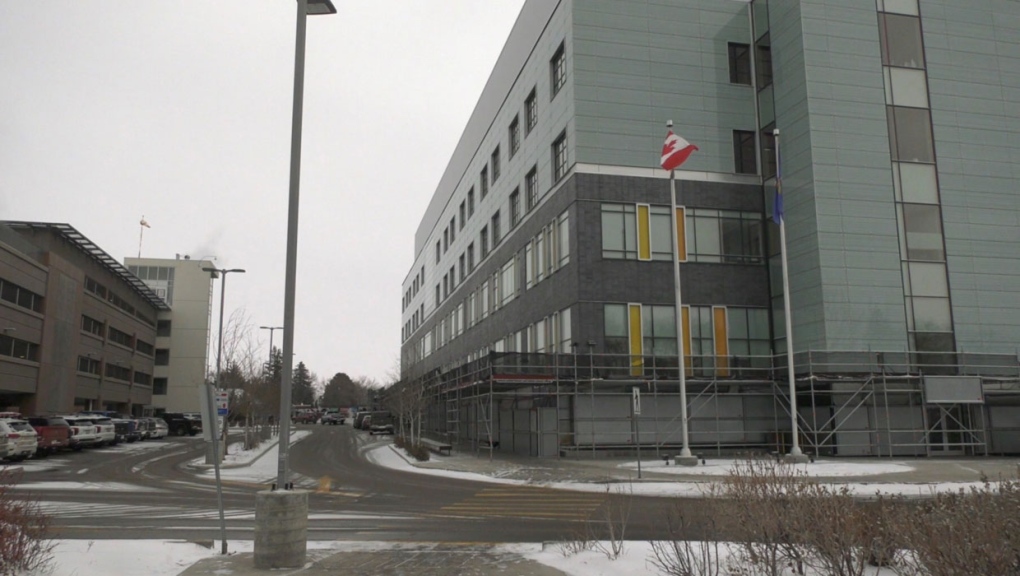Lethbridge's Chinook Regional Hospital over capacity, staffing challenges continue
 Alberta Health Services says Chinook Regional Hospital is over capacity and came very close to a position where it would need to divert patients to other health centres.
Alberta Health Services says Chinook Regional Hospital is over capacity and came very close to a position where it would need to divert patients to other health centres.
The rise in respiratory illnesses, RSV and COVID is putting a strain on hospitals across the province – including in Lethbridge.
Alberta Health Services says the Chinook Regional Hospital is over capacity as respiratory illnesses continue to climb.
"We’re over 100 per cent because of the additional spaces that we've opened up. So, when we do ‘over capacity,’ we opened seven additional beds, plus we opened four additional – these are medical beds," said Dr. Aaron Low, South Zone medical director with AHS.
"This hasn't happened in a long time."
Low says 17 out of 20 ICU beds have been taken up by adult patients, many suffering from influenza.
He attributes nursing staffing challenges to the over capacity levels.
Low says if the Chinook Regional Hospital received anymore ICU patients over the weekend, they would have had to transfer them to other hospitals.
"For a brief period of time, only hours, we did put in a process where if we would've received any additional ICU level patients, we would've diverted them, like I said, we didn't have to do that but for a brief period of time, we almost had to do that," Low said.
The flu season is expected to be causing the rising numbers of admissions, according to AHS.
"The circulating strains are more severe strains, and that’s probably why we’re seeing such a severe viral season in Alberta," Low said. "The vast majority of the viral illness right now is influenza, but there are other viruses as well including RSV and some COVID, but not tons actually."

The Alberta NDP is calling on the UCP to step in and address the health care crisis in the city.
"I want the UCP to take responsibility for it and clearly communicate to the public what they'rer going to do solve it, whether it's the skilled labour shortage, whether it is the doctor shortage, whether it's the primary care access issues that we have in southern Alberta and across southern Alberta," said Shannon Phillips, Lethbridge-West MLA.
Low says while the capacity remains over 100 per cent, he expects it to only have a short-term impact on the hospital.
"We generally run in hospitals in Canada and Alberta at very close to capacity, so we don't have 20 per cent of beds, for example, that we keep just in case of, we generally run close to 100 per cent and that's the case across Alberta," Low said.
Low says increasing the vaccination rate for influenza, which currently sits at 20.7 per cent, will help reduce capacity levels in hospitals.
CTVNews.ca Top Stories

Quebec nurse had to clean up after husband's death in Montreal hospital
On a night she should have been mourning, a nurse from Quebec's Laurentians region says she was forced to clean up her husband after he died at a hospital in Montreal.
Northern Ont. lawyer who abandoned clients in child protection cases disbarred
A North Bay, Ont., lawyer who abandoned 15 clients – many of them child protection cases – has lost his licence to practise law.
Bank of Canada officials split on when to start cutting interest rates
Members of the Bank of Canada's governing council were split on how long the central bank should wait before it starts cutting interest rates when they met earlier this month.
'Life was not fair to him': Daughter of N.B. man exonerated of murder remembers him as a kind soul
The daughter of a New Brunswick man recently exonerated from murder, is remembering her father as somebody who, despite a wrongful conviction, never became bitter or angry.
Cuban government apologizes to Montreal-area family after delivering wrong body
Cuba's foreign affairs minister has apologized to a Montreal-area family after they were sent the wrong body following the death of a loved one.
What is changing about Canada's capital gains tax and how does it impact me?
The federal government's proposed change to capital gains taxation is expected to increase taxes on investments and mainly affect wealthy Canadians and businesses. Here's what you need to know about the move.
'It was instant karma': Viral video captures failed theft attempt in Nanaimo, B.C.
Mounties in Nanaimo, B.C., say two late-night revellers are lucky their allegedly drunken antics weren't reported to police after security cameras captured the men trying to steal a heavy sign from a downtown business.
'Anything to win': Trudeau says as Poilievre defends meeting protesters
Prime Minister Justin Trudeau is accusing Conservative Leader Pierre Poilievre of welcoming 'the support of conspiracy theorists and extremists,' after the Conservative leader was photographed meeting with protesters, which his office has defended.
'One of the single most terrifying things ever': Ontario couple among passengers on sinking tour boat in Dominican Republic
A Toronto couple are speaking out about their 'extremely dangerous' experience on board a sinking tour boat in the Dominican Republic last week.






























